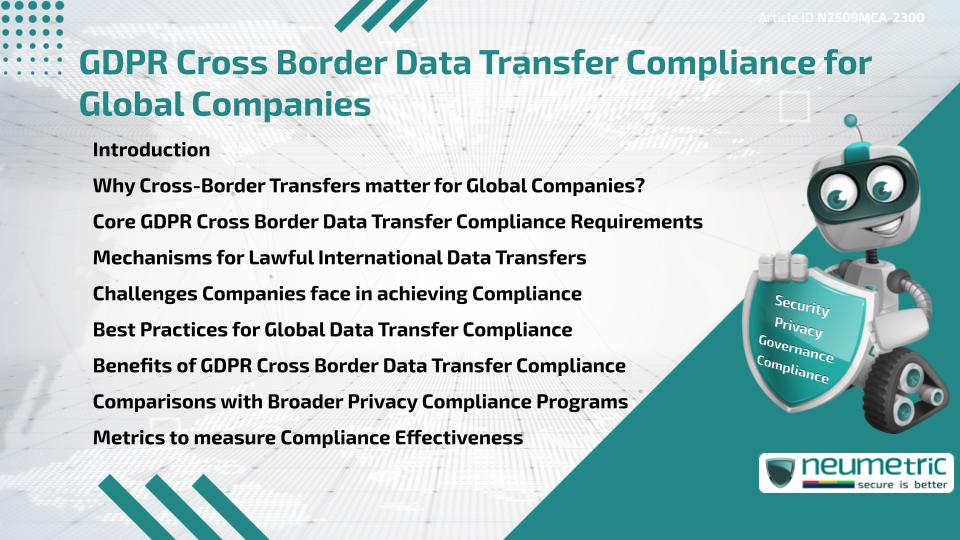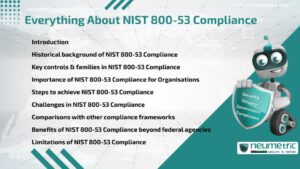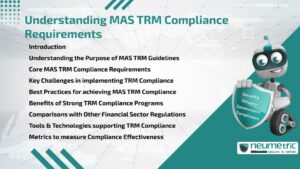Table of Contents
ToggleIntroduction
GDPR Cross Border Data Transfer Compliance is one of the most complex aspects of Data Privacy for Multinational Organisations. The General Data Protection Regulation [GDPR] restricts the movement of Personal Data outside the European Economic Area [EEA] unless specific safeguards are in place. For Global Companies, Compliance is essential to protect Individual Rights, reduce Legal Risks & maintain Customer Trust.
Why Cross-Border Transfers matter for Global Companies?
Global Companies often rely on International Data flows to support Business Operations, such as Cloud hosting, Customer service, Payroll or marketing. Without GDPR Cross Border Data Transfer Compliance, these Transfers Risk violating EU Law & triggering significant Penalties. More importantly, Unlawful Transfers can damage Brand reputation & disrupt Business Continuity. The European Commission GDPR site provides official guidance on Cross-Border rules.
Core GDPR Cross Border Data Transfer Compliance Requirements
To comply with GDPR, organisations must ensure that Personal Data Transferred outside the EEA is adequately protected. Key requirements include:
- Adequacy decisions: Transfers allowed to Countries recognised by the European Commission as providing equivalent protection.
- Standard Contractual Clauses [SCCs]: Contractual Agreements ensuring appropriate safeguards between Exporters & Importers.
- Binding Corporate Rules [BCRs]: Internal Policies approved by Regulators for Multinational Groups.
- Explicit Consent: In limited cases, Individuals may Consent to Transfers after being informed of Potential Risks.
- Supplementary measures: Technical & Organisational safeguards to strengthen Data Protection.
Mechanisms for Lawful International Data Transfers
Global organisations commonly rely on the following mechanisms:
- SCCs: Widely used since they provide Contractual guarantees enforceable under EU Law.
- BCRs: Suitable for large multinationals seeking consistency across Global Operations.
- Codes of Conduct & Certification Mechanisms: Newer tools introduced under GDPR for Sector-specific Compliance.
These mechanisms must be reviewed regularly to ensure ongoing Adequacy.
Challenges Companies face in achieving Compliance
Implementing GDPR Cross Border Data Transfer Compliance is not without obstacles:
- Constantly evolving Adequacy decisions & Legal frameworks
- Administrative burden of updating SCCs & Contracts
- Difficulties in applying Supplementary Technical Measures such as Encryption
- Complexities in coordinating Compliance aCross multiple Jurisdictions
- Balancing Business efficiency with strict Regulatory requirements
These challenges highlight the need for structured Compliance strategies.
Best Practices for Global Data Transfer Compliance
To strengthen GDPR Cross Border Data Transfer Compliance, Companies should:
- Conduct Data mapping to identify all International Transfers
- Use SCCs or BCRs as primary safeguards for non-adequate jurisdictions
- Implement Encryption & Pseudonymisation for Sensitive Transfers
- Train staff & Vendors on Cross-Border Compliance obligations
- Regularly review Adequacy decisions & Regulatory updates
Practical Frameworks for implementation are outlined in ISACA Compliance resources.
Benefits of GDPR Cross Border Data Transfer Compliance
Adopting Compliance practices brings several advantages:
- Reduced Risk of Regulatory Fines & Penalties
- Stronger Trust with Customers, Partners & Regulators
- Improved Business Continuity with Lawful International Operations
- Enhanced Governance & Accountability in Data flows
- Competitive differentiation as a Privacy-responsible Organisation
Comparisons with Broader Privacy Compliance Programs
While general Privacy Compliance programs address internal & domestic Data Protection, GDPR Cross Border Data Transfer Compliance focuses specifically on International flows. Unlike ISO 27701 or HIPAA, GDPR establishes strict Geographical limitations, making it unique among Global Frameworks.
Metrics to measure Compliance Effectiveness
Organisations can track success through:
- Number of Transfers supported by SCCs, BCRs or Adequacy decisions
- Frequency of Contract & Safeguard reviews
- Incidents of unlawful or unprotected Data Transfers
- Audit outcomes from Data Protection authorities
- Level of Employee Training on Cross-Border rules
Takeaways
- Ensures lawful & secure Transfer of Personal Data outside the EEA
- Protects Organisations from Regulatory Penalties & Legal Risks
- Strengthens Transparency & Accountability in Global Data flows
- Enhances Customer & Partner Trust in International Operations
- Promotes Business Continuity through compliant Data-sharing Mechanisms
- Supports integration of Technical & Contractual safeguards
- Positions Companies as Leaders in Global Data Privacy Compliance
FAQ
What is GDPR Cross Border Data Transfer Compliance?
It is the process of ensuring international Data Transfers comply with GDPR rules, protecting Personal Data outside the EEA.
What are Adequacy decisions?
They are rulings by the European Commission confirming certain Countries provide equivalent Data Protection Standards.
What are SCCs & BCRs?
SCCs are Standard Contractual Clauses ensuring safeguards for Transfers, while BCRs are Internal Corporate Rules approved by Regulators.
Can Consent be used for Cross-Border Transfers?
Yes, but only in limited cases where Individuals are informed of the Risks & provide Explicit Agreement.
What are Supplementary measures?
They include Encryption, Pseudonymisation & Technical safeguards to enhance Data Security during Transfers.
How often should safeguards be reviewed?
Safeguards should be reviewed regularly, particularly when Regulatory changes or new Adequacy rulings occur.
Do GDPR rules apply to Non-EU Companies?
Yes, any Organisation processing EU Residents’ Data must comply, regardless of its location.
Need help for Security, Privacy, Governance & VAPT?
Neumetric provides organisations the necessary help to achieve their Cybersecurity, Compliance, Governance, Privacy, Certifications & Pentesting needs.
Organisations & Businesses, specifically those which provide SaaS & AI Solutions in the Fintech, BFSI & other regulated sectors, usually need a Cybersecurity Partner for meeting & maintaining the ongoing Security & Privacy needs & requirements of their Enterprise Clients & Privacy conscious Customers.
SOC 2, ISO 27001, ISO 42001, NIST, HIPAA, HECVAT, EU GDPR are some of the Frameworks that are served by Fusion – a SaaS, multimodular, multitenant, centralised, automated, Cybersecurity & Compliance Management system.
Neumetric also provides Expert Services for technical security which covers VAPT for Web Applications, APIs, iOS & Android Mobile Apps, Security Testing for AWS & other Cloud Environments & Cloud Infrastructure & other similar scopes.
Reach out to us by Email or filling out the Contact Form…





